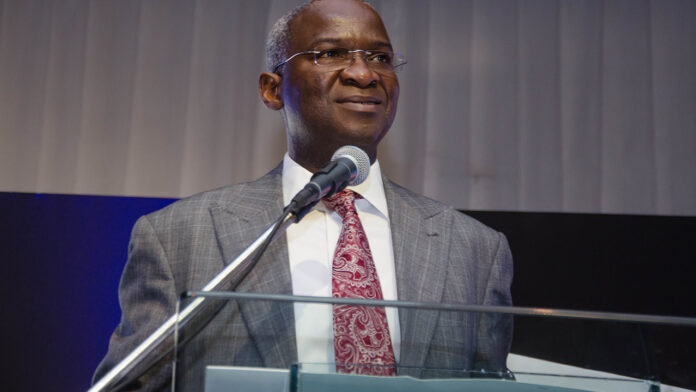By Moses Uwagbale
Minister of Works and Housing, Mr Babatunde Fashola, has restated the Nigeria’s commitment to infrastructure development to enhance economic growth and lift Nigerians out of poverty.
Fashola gave the assurance at the Lafarge Africa Plc inaugural Concrete Ideas webinar series with the theme: “Public-Private Partnership Approaches to Rapidly Upscaling Nigeria’s Economic Infrastructure.”
The Concrete Ideas webinar is a quarterly platform that assembles both national and international stakeholders to discuss strategic and topical issues in the area of construction and other sections of its value chain.
Fashola, the special guest of honour, said that President Muhammadu Buhari’s administration was committed to renew, rebuild and build Nigeria’s infrastructure.
He attributed the country’s infrastructure gap to slow down in infrastructure investments when compared with what was obtainable in the 70’s.
“There is nothing wrong with Nigeria, Nigeria did not have an infrastructure gap, it happened because Nigeria stopped investing in infrastructure like its competitors,” Fashola said.
He said that the country’s population had been growing in spite of drop in infrastructure development.
According to him, the country needs to invest a sizeable proportion of the Gross Domestic Product in infrastructure to match its population.
He noted that government would continue to promote Public Private Participation (PPP) in infrastructure financing and development.
“PPP has continual place in government’s developmental and finance strategy,” Fashola said.
The minister, however, said that government’s priority at the moment is to ensure the survival of the private sector.

He explained that there was no abundance of capital in the world ready to be invested because of coronavirus pandemic.
Fashola said that COVID-19 pandemic had affected private sector capital and investment, adding that Nigeria needed to borrow to finance infrastructure.
“Most part of the world is in recession or in survival mood due to COVID-19.
“Governments are trying to save their private sector across the world and Nigeria is not exempted.
“If we don’t defeat the virus, we will not have the type of economy we want,” he said.
He noted that government had introduced various reliefs in order to keep the private sector moving.
Mr Miljan Gutovic, Head, Middle East Africa LafargeHolcium, said that Nigeria as the biggest economy in Africa needed infrastructure for growth and development.
Gutovic said the company had been involved in PPP across the world, noting that infrastructure creates economic activities for citizens.
He disclosed that private sector invested about $100m in infrastructure in Africa and Middle East in 2019.
Gutovic called for a legal framework that would support PPP investments Nigeria.
Mr Bismarck Rewane, the Chief Executive Officer, Financial Derivatives, said that leakages in the country should be sealed.
Rewane stressed the need for completion of ongoing projects for the country to move forward.
He added that idle, stranded assets and uncompleted projects should be sold to the private sector for economic growth and development.
Rewane said that private sector would deploy capital where they can make profit, stressing the need for the right pricing mechanism.
Also speaking, the Chief Executive Officer of Chapel Hill Denham, Mr Bolaji Balogun, said Nigeria needs to increase infrastructure spending by 20 per cent yearly to tackle infrastructure deficit.
Balogun said that government should not depend solely on PPP for infrastructure financing.
He said that government should access the capital market for infrastructure financing and development.
Balogun said that PPP was one facet of private capital available for development of infrastructure.




